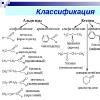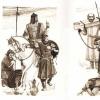В данной статье приведен пример преобразования формы активного залога Future Perfect в форму пассивного залога. Для выполнения данной задачи нам необходимо воспользоваться структурной схемой утвердительного предложения времени Future Perfect :
Subject
+ will have
+ Verb III form
+ Object
Подлежащее
+ will have
+ Глагол III формы
+ Object
Преобразование в пассивную форму начнем с замены смыслового глагола следующей синтаксической конструкцией:
to be + V III form
Данная конструкция говорит нам, что мы должны преобразовать вспомогательный глагол to be в ту форму, в которой стоит смысловой глагол в предложении исходного активного залога. А сам смысловой глагол должен быть преобразован в глагол III формы. Следуя данному правилу, мы преобразуем глагол to be в третью форму – been, а также и смысловой глагол в эту же форму (так как он и так уже находится в третьей форме, то смысловой глагол не меняется). Так же, подлежащее и дополнение меняются местами, т.к. в пасивном залоге меняется направление воздействия с субъекта на объект. В итоге получим следующую структуру, соответствующую пассивному залогу времени Future Perfect в утвердительной форме:
Subject
+ will have been
+ Verb III form
+
Подлежащее
+ will have been
+ Глагол III формы
+
Will
+ Subject
+ have been
+ Verb III
+ ?
Will
+ Подлежащее
+ have been
+ Глагол III
+ ?
Subject
+ will
+ not
+ have been
+ Verb III
+
Подлежащее
+ will
+ not
+ have been
+ Глагол III
+
Примеры предложений:
| Active voice | Passive voice |
|---|---|
| Утвердительная форма | |
| She will have finished the performance by 8 o’clock. Она завершит выступление к 8 часам. |
The performance will have been finished by 8 o’clock. Выступление будет завершено к 8 часам. |
| They will have repaired the car by the next week. Они отремонтируют автомобиль к следующей неделе. |
The car will have been repaired by the next week. Автомобиль будет отремонтирован к следующей неделе. |
| I will have made the toy by your birthday. Я сделаю игрушку к твоему дню рождения. |
The toy will have been made by your birthday. Игрушка будет сделана к твоему дню рождения. |
| He will have read the letters by your return. Он прочтет письма к твоему возвращению. |
The letters will have been read by your return. Письма будут прочтены к твоему возвращению. |
| Вопросительная форма | |
| Will she have finished the performance by 8 o’clock? Она завершит выступление к 8 часам? |
Will the performance have been finished by 8 o’clock? Выступление будет завершено к 8 часам? |
| Will they have repaired the car by the next week? Они отремонтируют автомобиль к следующей неделе? |
Will the car have been repaired by the next week? Автомобиль будет отремонтирован к следующей неделе? |
| Will I have made the toy by your birthday? Я сделаю игрушку к твоему дню рождения? |
Will the toy have been made by your birthday? Игрушка будет сделана к твоему дню рождения? |
| Will he have read the letters by your return? Он прочтет письма к твоему возвращению? |
Will the letters have been read by your return? Письма будут прочтены к твоему возвращению? |
| Отрицательная форма | |
| She will not have finished the performance by 8 o’clock. Она не завершит выступление к 8 часам. |
The performance will not have been finished by 8 o’clock. Выступление не будет завершено к 8 часам. |
| They will not have repaired the car by the next week. Они не отремонтируют автомобиль к следующей неделе. |
The car will not have been repaired by the next week. Автомобиль не будет отремонтирован к следующей неделе. |
| I will have not made the toy by your birthday. Я не сделаю игрушку к твоему дню рождения. |
The toy will not have been made by your birthday. Игрушка не будет сделана к твоему дню рождения. |
| He will not have read the letters by your return. Он не прочтет письма к твоему возвращению. |
The letters will not have been read by your return. Письма не будут прочтены к твоему возвращению. |
Рассмотрим пример преобразования активного залога в пассивный для времени Past Continuous . Для этого нам понадобиться ее структурная схема для утвердительного предложения:
Subject
+ was/were
+ Ving form
+ Object
Подлежащее
+ was/were
+ Глагол ing-формы
+ Объект
Для преобразования в пассивную форму необходимо заменить смысловой глагол следующей конструкцией:
to be + V III form
Данная конструкция говорит нам, что мы должны преобразовать вспомогательный глагол to be в ту форму, в которой стоит смысловой глагол в предложении исходного активного залога. А сам смысловой глагол должен быть преобразован в глагол III формы. После преобразования, вспомогательный глагол to be будет преобразован в IV форму (ing-форма), а сам смысловой глагол будет записан в третей форме (для неправильных глаголов) или в ed-форме (для правильных). Так же, подлежащее и дополнение меняются местами, т.к. в пассивном залоге меняется направление воздействия с субъекта на объект. В итоге получим следующую структуру, соответствующую пассивному залогу времени Past Continuous в утвердительной форме:
Subject
+ was/were been
+ V III
+
Подлежащее
+ was/were been
+ Глагол III
+
Вопросительная форма:
Was/Were
+ Subject
+ been
+ V III
+
Was/Were
+ Подлежащее
+ been
+ Глагол III
+
Отрицательная форма:
Subject
+ was/were
+ not
+ been
+ V III
+
Подлежащее
+ was/were
+ not
+ been
+ Гл. III
+
Примеры предложений:
| Active voice | Passive voice |
|---|---|
| Утвердительная форма | |
| He was painting this picture at 9 o’clock yesterday. Вчера в 9 часов он рисовал эту картину. |
This picture was been painted at 9 o’clock yesterday. Эту картину рисовали вчера в 9 часов. |
| We were cleaning the floor when she came. Мы мыли пол, когда она пришла. |
The floor was been cleaned when she came. Пол мыли, когда она пришла. |
| Вопросительная форма | |
| Was he painting this picture at 9 o’clock yesterday? Вчера в 9 часов он рисовал эту картину? |
Was this picture been painted at 9 o’clock yesterday? Эту картину рисовали вчера в 9 часов? |
| Were we cleaning the floor when she came? Мы мыли пол, когда она пришла? |
Was the floor been cleaned when she came? Пол мыли, когда она пришла? |
| Отрицательная форма | |
| He was not painting this picture at 9 o’clock yesterday. Вчера в 9 часов он не рисовал эту картину. |
This picture was not been painted at 9 o’clock yesterday. Эту картину не рисовали вчера в 9 часов. |
| We were not cleaning the floor when she came. Мы не мыли пол, когда она пришла. |
The floor was not been cleaned when she came. Пол не мыли, когда она пришла. |
Упражнения на пассивный залог во времени Present Perfect. Exercises with answers. Полезные разноплановые упражнения на страдательный залог помогут Вам разобраться в данной теме.
Упражнение 1. Read the texts and find the sentences with Present Perfect Active and Present Perfect Passive tense forms. Translate them into your language.
Nina has lived in Sydney for two years. She has done a lot of things in Sydney. She has seen several plays, she has gone to the picture galleries and museums. She has visited the circus as well, and she has taken a tour to the Islands on Port Jackson. However, there are a lot of planned things she hasn’t done yet. She hasn’t gone to the Australian Reptile Park yet. Nina hasn’t been to some other parks yet.
The boss is angry with his secretary today because important letters haven’t been typed yet. Tea has been given to him cold. Wrong telephone numbers have been written down. The mail hasn’t been sent in time. A lot of time has been spent over the telephone.
Упражнение 2. Change the sentences with Present Perfect Active into Present Perfect Passive.
I have already finished my work. My work ...
My work has already been finished.
- I have already taken the books back to the library. The books ...
- She has just posted those letters. Those letters ...
- The teacher has already checked my test. My test ... —
- He has lost the key. The key ...
- We have opened all the windows. All the windows ... "
- I have bought bread on the way home. Bread ...
- I have done this exercise. This exercise ...
Упражнение 3. Imagine that your classroom and the school yard have been thoroughly cleaned. Say what has been done by whom.
Example The windows ... (to wash)
The windows have been washed by the girls.
- The desks ... (to wash)
- The flowers ... (to water)
- The floor ... (to mop)
- The furniture ... (to dust)
- The grass ... (to cut)
- The trees ... (to cut)
Упражнение 4. Answer the questions about your English lesson using Present Perfect Passive.
- Have you been asked to read a text?
- Has the text been translated?
- Have the new words been written down?
- Have the exercises been done by all the pupils?
- Has your friend been asked to recite something?
- Has large homework been given?
- Who has been given good (bad) marks?
- Have you been praised by the teacher?
Упражнение 5. Use Present Perfect Active or Passive of the verbs in brackets to complete the sentences.
- Peter ... (to break) the window.
- The exercise ... (to write) already.
- The text ... (to translate) by Victor.
- The teacher just ... (to explain) the new rule.
- We (to learn) the Passive Voice already.
- A new school ... (to build) in this street.
Упражнение 6. Translate into English using Present Perfect Active or Passive.
- Я только что купил газету
- Телевизор только что выключили.
- Он уже ответил на вопрос
- Слова только что написали на доске
- Мы уже говорили об этом
- Все ответы уже даны.
- Об этом только что сказали по радио.
- Я уже смотрел этот фильм
- Мне ничего об этом не говорили
- Все предложения уже написаны.
Ответы:
Упражнение 1.
All the sentences in text A are in Present Perfect Active.
All the sentences in text B are in Present Perfect Passive.
Упражнение 2.
- The books have been already taken back to the library by me.
- Those letters have just been posted by her.
- My test has already been checked by the teacher.
- The key has been lost by him.
- All the windows have been opened by us.
- Bread has been bought by me on the way home.
- This exercise has been done by me.
Упражнение 3.
- The desks have been washed by the pupils.
- The flowers have been watered by Molly.
- The floor has been mopped by the cleaners.
- The furniture has been dusted by the boys.
- The grass has been cut by the caretaker.
- The trees have been cut by the workmen.
Упражнение 4. Your own answers.
Упражнение 5.
1 has broken, 2 has been already written, 3 has been translated, 4 has just explained, 5 have learnt, 6 has been built
Упражнение 6.
- I have just bought the newspaper.
- The TV-set has just been switched off.
- Не has already answered this question.
- The words have just been written on the blackboard.
- We’ve already spoken about it.
- All the answers have already been given.
- This has been just said over the radio.
- I’ve already watched this film.
- I haven’t been told anything about it.
- All the sentences have already been written.


